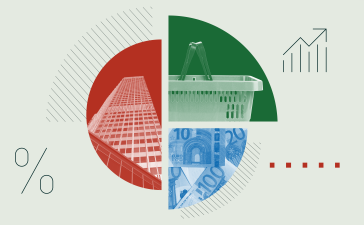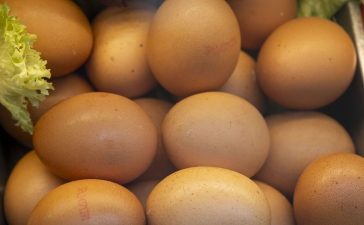Food inflation in the UK has risen for the fourth month in a row, figures show, driven by increases in the cost of fresh produce, including steak.
The annual rate of food price rises hit 2.8% this month, after a 2.6% rise in April, according to the latest shop price data from the British Retail Consortium (BRC).
However, prices overall remained in deflation – 0.1% cheaper than a year ago and unchanged from last month – with the cost of non-food goods falling, particularly for electricals as retailers cut prices to drum up business before a potential hit from Donald Trump’s tariffs.
The BRC’s monthly shop price index, carried out in conjunction with the research firm NielsenIQ, found that fresh food was the biggest contributor.
“Fresh foods were the main driver, and red meat eaters may have noticed their steak got a little more expensive as wholesale beef prices increased,” said Helen Dickinson, the BRC chief executive.
The cost of non-food goods fell by 1.5% compared with May last year, but the BRC warned that the rate of deflation was slowing in categories such as fashion and furniture as retailers began to pull back on promotions.
The BRC said the overall deflationary market was coming under pressure as retailers absorbed a £5bn cost hit from last month’s increase in employer national insurance contributions, and the rise in the “national living wage”.
Later this year, retailers will also have to absorb a £2bn rise in costs relating to a new packaging tax.
The BRC said the cost increases could force retailers to pass on price rises to consumers, meaning households will have to “brace themselves for more difficult times ahead as prices rise faster”.
The shop price data follows a surge in inflation across the wider economy. Last week, the Office for National Statistics reported a larger than expected jump in annual inflation to 3.5% in April. The increase, to the highest rate in more than a year, followed dramatic increases in water bills, energy costs and council tax.
after newsletter promotion
The increase was fuelled by higher payments for gas, electricity, water and transport that led to last month being called “awful April”.
Last Friday, the energy regulator Ofgem said the cap on gas and energy charges would fall 7% from July, the equivalent of £129 a year for the average home on a typical dual-fuel bill. The rare dose of good news, and a further expected reduction expected when Ofgem reassesses the cap again in September, has led some analysts to say this trend should limit the rise in inflation this year.
The Bank of England forecast earlier this month that inflation would peak at an average 3.5% over the summer months.









